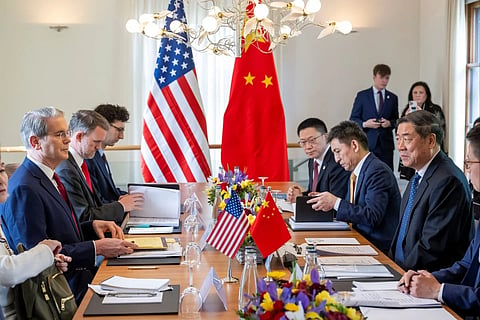

The United States and China concluded two days of high-level trade talks in London with a tentative agreement on a framework aimed at resolving key economic disputes. Both sides said the deal, agreed “in principle”, would now be reviewed by their respective leaders.
Chinese Vice-Commerce Minister and chief negotiator Li Chenggang told reporters that the framework builds on the consensus reached during a recent phone call between President Xi Jinping and President Donald Trump, as well as discussions held in Geneva last month.
“We will take back a report to our leaders on the London talks and the framework agreed in Geneva,” Li said. “We hope this progress will contribute to building greater trust between China and the United States.”
US Commerce Secretary Howard Lutnick echoed that sentiment, saying his team would consult with President Trump before moving forward. “They’ll do the same with President Xi, and if both approve, we’ll implement the framework,” he said. “Our presidents are backing this, and that gave us the extra push to get it done.”
Lutnick added that the fundamental goal was to increase trade and reduce the deficit. “This was just the first step in a broader effort to grow trade between our countries.”
The London meeting followed a phone call between Xi and Trump that appeared to ease weeks of renewed tensions. The two leaders agreed to resume negotiations after both sides accused each other of violating the 90-day trade truce they had reached in Geneva in May.
China’s delegation was led by Vice-Premier He Lifeng. The US team included Treasury Secretary Scott Bessent and Trade Representative Jamieson Greer, in what officials described as the first session of the newly established China-US economic and trade consultation mechanism.
While US officials struck an optimistic tone, Greer acknowledged that some issues remain unresolved. “There are areas where our economies just don’t fit neatly together,” he said. “But if we can fully implement the Geneva agreement, it will open the door for broader discussions.”
The current trade truce is set to expire on August 12 unless extended. Under the Geneva deal, US tariffs on Chinese goods were cut from 145 percent to 30 percent, while China reduced its duties on American imports from 125 percent to 10 percent.
Still, friction continues over sensitive sectors. Washington has imposed new export controls on jet engine and chip design technologies, citing security concerns. At the same time, it has expressed growing frustration over China’s delays in approving rare earth exports.
Rare earths—essential for electronics, defence, and renewable energy—have become a central issue in the US-China economic rivalry. China controls the bulk of global supply, giving it substantial leverage. In response, Washington is seeking to build alternative supply chains with Southeast Asian nations.